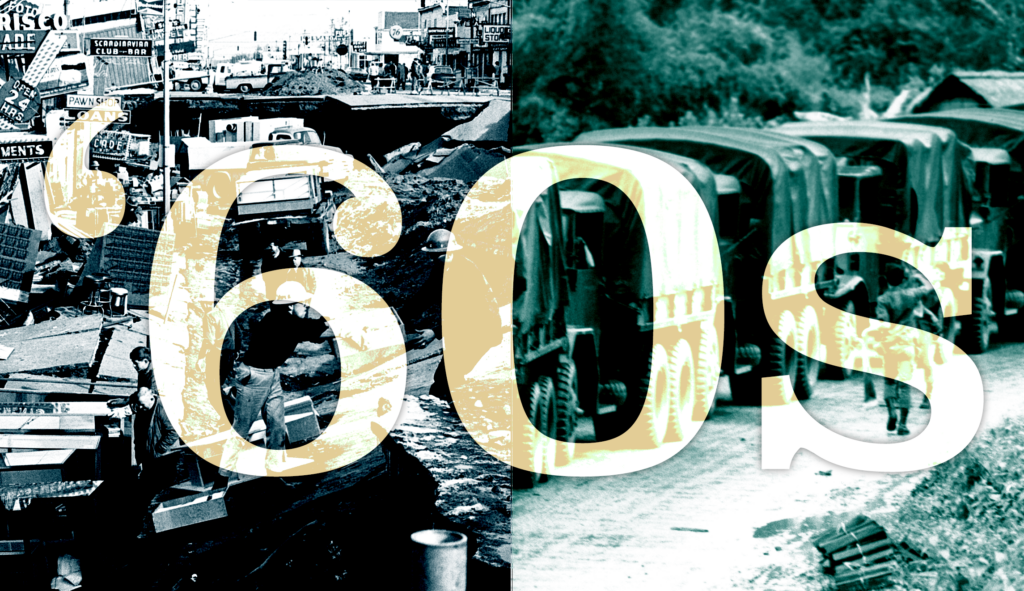Jim Phillips needed direction upon graduating high school in 1963, so he enlisted in the Army. He couldn’t have known then the dramatic experiences he was about to endure.
After initial training, Private Phillips was qualified for vehicle work and was stationed in Alaska, where he dealt with enormous tires and low temperatures. Of his first Alaskan winter, the Californian said, “That was the coldest thing I ever seen in my whole life.” Vehicles couldn’t stop on the ice. The soldiers, even in cold-weather gear, could only function for a limited time in the freezing wind.
On March 27, 1964, a 9.2 magnitude earthquake, the most powerful ever recorded in North America, devastated the Anchorage area. “I’ve been through earthquakes, but that [one] scared me.” As soon as it was over, Phillips and other soldiers grabbed a jeep and drove to assist people in Anchorage. In the following months, there was a lot of road reconstruction work.

Eventually, Private Phillips was happy to be ordered to leave Alaska. “I couldn’t handle another winter up there.”
But he was sent from frozen Alaska to the hot jungles of Vietnam. Over a thousand troops were packed aboard a ship designed for 800. Phillips said two men died just getting off the ship. They’d arrived in Vietnam well ahead of their gear, and while most Vietnam troops sported lighter, hot-weather clothing, Phillips baked in his heavy field jacket from Alaska. He had very little training for Vietnam. A mechanic, he was determined not to kill or be killed.
Right away, he and some others were assigned to drive big trucks through Saigon to reach a base near the city. They negotiated a traffic circle so packed with people they were forced to take an alternative route. On that detour, a woman, paid $25 by the North Vietnamese, threw her child at Private Phillips’s truck as part of a campaign to turn public opinion against Americans. Miraculously, the child wasn’t hurt too badly. “That shook me up,” Phillips said.
On base, Private Phillips returned to the work he knew best, changing truck tires, and he might have been happy serving out his time this way until he was ordered to a busy morgue to pack bodies. He hadn’t trained for that. So he sneaked off the base, circled around through the jungle, and reentered near his mechanic section, where he resumed changing tires. Someone came looking for him. “Well, I gotta get these wheels changed cause we can’t move these trucks until they got new wheels!” Phillips protested. They left him alone.
But for all his desire to stick to mechanic work, he couldn’t escape base perimeter guard duty. Everyone took their shift, and when one guard position fired on attackers or suspected infiltrators, all fired. “I can’t shoot anybody like that,” Phillips told me. “The hills were covered in brush, so I would just look at a part where it looked like nobody was there and shoot at that.” One night, manning a machine gun for which he’d been poorly trained, he saw a large man approaching from the jungle. Phillips yelled “Stop!” The man continued. So Phillips fired. Luckily he missed because the man was an Army sergeant who’d been outside the perimeter for some reason.
Pfc. Jim Phillips told me more stories — about passes to Saigon, trouble on poorly armed convoys, and spooky sights in the jungle at night. “You don’t feel safe over there, and you’re not really,” he said. Reflecting on his service in two dangerous areas with very different climes, he was pleased to get out of both places alive.
Upon returning to the civilian world, Jim had trouble securing a job at first, but his fortune eventually improved. He met his wife and they raised a family. But even now, over half a century later, you can still hear the wonder in his voice as he reflects upon his years in uniform.
CLICK HERE TO READ MORE FROM THE WASHINGTON EXAMINER
Trent Reedy, author of several books including Enduring Freedom, served as a combat engineer in the Iowa National Guard from 1999 to 2005, including a tour of duty in Afghanistan.
*Some names and call signs in this story may have been changed due to operational security or privacy concerns.
